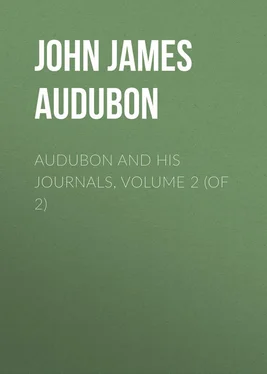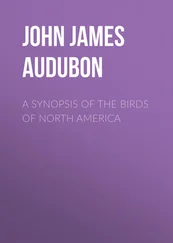John Audubon - Audubon and his Journals, Volume 2 (of 2)
Здесь есть возможность читать онлайн «John Audubon - Audubon and his Journals, Volume 2 (of 2)» — ознакомительный отрывок электронной книги совершенно бесплатно, а после прочтения отрывка купить полную версию. В некоторых случаях можно слушать аудио, скачать через торрент в формате fb2 и присутствует краткое содержание. Жанр: foreign_antique, foreign_prose, на английском языке. Описание произведения, (предисловие) а так же отзывы посетителей доступны на портале библиотеки ЛибКат.
- Название:Audubon and his Journals, Volume 2 (of 2)
- Автор:
- Жанр:
- Год:неизвестен
- ISBN:нет данных
- Рейтинг книги:5 / 5. Голосов: 1
-
Избранное:Добавить в избранное
- Отзывы:
-
Ваша оценка:
- 100
- 1
- 2
- 3
- 4
- 5
Audubon and his Journals, Volume 2 (of 2): краткое содержание, описание и аннотация
Предлагаем к чтению аннотацию, описание, краткое содержание или предисловие (зависит от того, что написал сам автор книги «Audubon and his Journals, Volume 2 (of 2)»). Если вы не нашли необходимую информацию о книге — напишите в комментариях, мы постараемся отыскать её.
Audubon and his Journals, Volume 2 (of 2) — читать онлайн ознакомительный отрывок
Ниже представлен текст книги, разбитый по страницам. Система сохранения места последней прочитанной страницы, позволяет с удобством читать онлайн бесплатно книгу «Audubon and his Journals, Volume 2 (of 2)», без необходимости каждый раз заново искать на чём Вы остановились. Поставьте закладку, и сможете в любой момент перейти на страницу, на которой закончили чтение.
Интервал:
Закладка:
Audubon and his Journals, Volume 2 (of 2)
THE MISSOURI RIVER JOURNALS
1843
( Continued )
June 4, Sunday. We have run pretty well, though the wind has been tolerably high; the country we have passed this day is somewhat better than what we saw yesterday, which, as I said, was the poorest we have seen. No occurrence of interest has taken place. We passed this morning the old Riccaree 1 1 "We halted for dinner at a village which we suppose to have belonged to the Ricaras. It is situated in a low plain on the river, and consists of about eighty lodges of an octagon form, neatly covered with earth, placed as close to each other as possible, and picketed round." ("Lewis and Clark," ed. 1893.) "The village of the Rikaras, Arickaras, or Rikarees, for the name is variously written, is between the 46th and 47th parallels of north latitude, and 1,430 miles above the mouth of the Missouri… It was divided into two portions, about eighty yards apart, being inhabited by two distinct bands. The whole extended about three quarters of a mile along the river bank, and was composed of conical lodges, that looked like so many small hillocks, being wooden frames intertwined with osier, and covered with earth." ("Astoria," W. Irving.) "From the hills we had a fine prospect over the bend of the river, on which the villages of the Arikkaras are situated. The two villages of this tribe are on the west bank, very near each other, but separated by a small stream. They consist of a great number of clay huts, round at top, with a square entrance in front, and the whole surrounded with a fence of stakes, which were much decayed and in many places thrown down." ("Travels in North America," p. 166, Maximilian, Prince of Wied.)
Village, where General Ashley 2 2 "General Ashley of Missouri, a man whose courage and achievements in the prosecution of his enterprises had rendered him famous in the Far West in conjunction with Mr. [Andrew?] Henry, of the Missouri Trading Co., established a post on the banks of the Yellowstone River in 1822." ("Capt. Bonneville," W. Irving.)
was so completely beaten as to lose eighteen of his men, with the very weapons and ammunition that he had trafficked with the Indians of that village, against all the remonstrances of his friends and interpreters; yet he said that it proved fortunate for him, as he turned his steps towards some other spot, where he procured one hundred packs of Beaver skins for a mere song. We stopped to cut wood at an old house put up for winter quarters, and the wood being ash, and quite dry, was excellent. We are now fast for the night at an abandoned post, or fort, of the Company, where, luckily for us, a good deal of wood was found cut. We saw only one Wolf, and a few small gangs of Buffaloes. Bell shot a Bunting which resembles Henslow's, but we have no means of comparing it at present. We have collected a few plants during our landing. The steam is blowing off, and therefore our day's run is ended. When I went to bed last night it was raining smartly, and Alexis did not go off, as he did wish. By the way, I forgot to say that along with the three Prairie Marmots, he brought also four Spoon-billed Ducks, which we ate at dinner to-day, and found delicious. Bell saw many Lazuli Finches this morning. Notwithstanding the tremendous shaking of our boat, Sprague managed to draw four figures of the legs and feet of the Wolf shot by Bell yesterday, and my own pencil was not idle.
June 5, Monday. Alexis went off in the night sometime, and came on board about three o'clock this morning; he had seen nothing whatever, except the traces of Beavers and of Otters, on Beaver Creek, which, by the way, he had to cross on a raft. Speaking of rafts, I am told that one of these, made of two bundles of rushes, about the size of a man's body, and fastened together by a few sticks, is quite sufficient to take two men and two packs of Buffalo robes across this muddy river. In the course of the morning we passed Cannon Ball River, 3 3 "We reached the mouth of Le Boulet, or Cannon Ball River. This stream rises in the Black Mts. and falls into the Missouri; its channel is about 140 feet wide, though the water is now confined within 40; its name is derived from the numbers of perfectly round stones on the shore and in the bluffs just above." ("Lewis and Clark," ed. 1893.) "We came to an aperture in the chain of hills, from which this river, which was very high, issues. On the north side of the mouth there was a steep, yellow clay wall; and on the southern, a flat, covered with poplars and willows. This river has its name from the singular regular sandstone balls which are found in its banks, and in those of the Missouri in its vicinity. They are of various sizes, from that of a musket ball to that of a large bomb, and lie irregularly on the bank, or in the strata, from which they often project to half their thickness; when the river has washed away the earth they then fall down, and are found in great numbers on the bank. Many of them are rather elliptical, others are more flattened, others flat on one side and convex on the other. Of the perfectly spherical balls, I observed some two feet in diameter. A mile above the mouth of Cannon Ball River I saw no more of them." ("Travels in North America," p. 167, Maximilian, Prince of Wied.)
and the very remarkable bluffs about it, of which we cannot well speak until we have stopped there and examined their nature. We saw two Swans alighting on the prairie at a considerable distance. We stopped to take wood at Bowie's settlement, at which place his wife was killed by some of the Riccaree Indians, after some Gros Ventres had assured him that such would be the case if he suffered his wife to go out of the house. She went out, however, on the second day, and was shot with three rifle-balls. The Indians took parts of her hair and went off. She was duly buried; but the Gros Ventres returned some time afterwards, took up the body, and carried off the balance of her hair. They, however, reburied her; and it was not until several months had elapsed that the story came to the ears of Mr. Bowie. We have also passed Apple Creek, 4 4 Present name of the stream which falls into the Missouri from the east, about five miles below Fort Rice; Chewah or Fish River of Lewis and Clark; Shewash River of Maximilian. Audubon is now approaching Bismarck, the capital of North Dakota. – E. C.
but the chief part is yet to be added. At one place where the bluffs were high, we saw five Buffaloes landing a few hundred yards above us on the western side; one of them cantered off immediately, and by some means did reach the top of the hills, and went out of our sight; the four others ran, waded, and swam at different places, always above us, trying to make their escape. At one spot they attempted to climb the bluff, having unconsciously passed the place where their leader had made good his way, and in their attempts to scramble up, tumbled down, and at last became so much affrighted that they took to the river for good, with the intention to swim to the shore they had left. Unfortunately for them, we had been gaining upon them; we had all been anxiously watching them, and the moment they began to swim we were all about the boat with guns and rifles, awaiting the instant when they would be close under our bows. The moment came; I was on the lower deck among several of the people with guns, and the firing was soon heavy; but not one of the Buffaloes was stopped, although every one must have been severely hit and wounded. Bell shot a load of buckshot at the head of one, which disappeared entirely under the water for perhaps a minute. I sent a ball through the neck of the last of the four, but all ineffectually, and off they went, swimming to the opposite shore; one lagged behind the rest, but, having found footing on a sand-bar, it rested awhile, and again swam off to rejoin its companions. They all reached the shore, but were quite as badly off on that side as they had been on the other, and their difficulties must have been great indeed; however, in a short time we had passed them. Mr. Charles Primeau, 5 5 Charles Primeau was born at St. Louis, Mo., entered the American Fur Company as clerk, and continued in that service many years. Later he helped to form an opposition company under the name of Harvey, Primeau, & Co., which did business for a few years, until, like most of the smaller concerns, it was absorbed by the American Fur Co. He then went back to his former employers, and afterward was engaged by the U.S. Government as Indian interpreter, long holding this position. In 1896 he was living in the vicinity of Fort Yates. – E. C.
Интервал:
Закладка:
Похожие книги на «Audubon and his Journals, Volume 2 (of 2)»
Представляем Вашему вниманию похожие книги на «Audubon and his Journals, Volume 2 (of 2)» списком для выбора. Мы отобрали схожую по названию и смыслу литературу в надежде предоставить читателям больше вариантов отыскать новые, интересные, ещё непрочитанные произведения.
Обсуждение, отзывы о книге «Audubon and his Journals, Volume 2 (of 2)» и просто собственные мнения читателей. Оставьте ваши комментарии, напишите, что Вы думаете о произведении, его смысле или главных героях. Укажите что конкретно понравилось, а что нет, и почему Вы так считаете.












